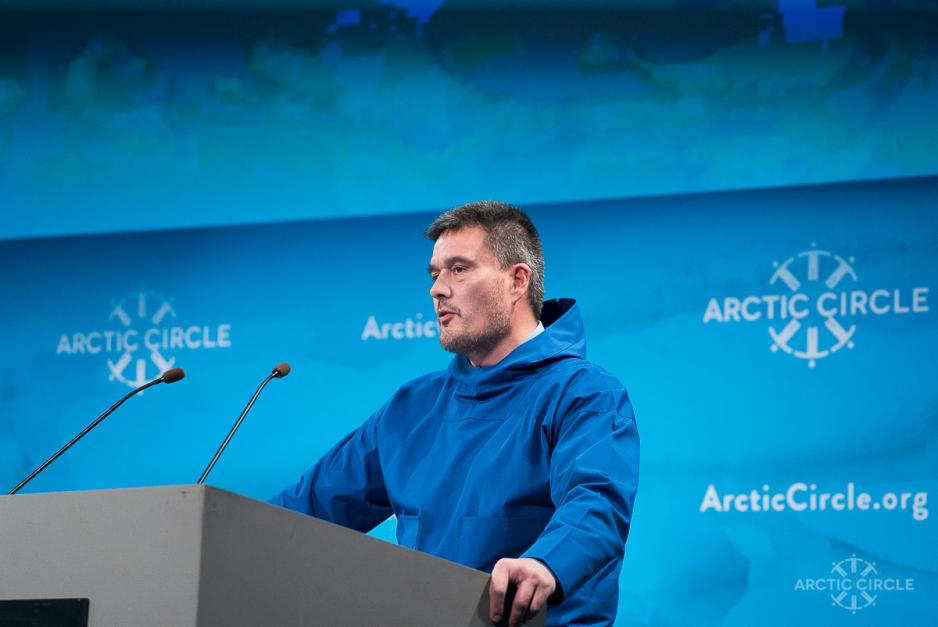Newsletter: Greetings from the national park

At the opening of the Arctic Circle Assembly 2019, Greenland Premier Kim Kielsen reiterated that Greenland is open for business, not for sale. (Photo: Arctic Circle)
Dear High North News reader!
This week, more than 2,000 participants from 60 countries gather in Reykjavik, Iceland for the Arctic Circle Assembly. For three days, discussions will abound about challenges and opportunities in a region hit hard by climate changes, yet one that also has four million inhabitants with a need and desire for economic growth and development.
Among the prominent guests speaking at the opening event were US Energy Minister Rick Perry and HRH Crown Princess Victoria of Sweden.
Climate changes were a recurring theme in all opening talks, and there is no doubt that something needs to be done – preferably soon. But how to do it and at the expense of what? Now, that is a matter on which it seems harder to agree.
"But how does Norway respond to these challenges, you may ask? What did Norway answer when asked how the climate change in the Arctic can be tamed? Nothing, is the answer. The country that claims the High North is its most important strategic asset is completely absent on the political level. Norway stays at home, brooding that the Icelanders, who barely have a stripe of land above the Arctic Circle, takes control over important Arctic questions", our Editor-in-Chief Arne O. Holm writes in this week's Friday op-ed.
The national park
Some of the questions from the audience also indicate that there is a need for busting some myths about what actually happens and who actually lives north of the Arctic Circle.
For instance: “Have you done the math?” The question was put to Greenland’s Premier Kim Kielsen, with a reference to the USA’s offer to buy the country from Greenland. “You cannot exchange Greenland for money. We do not have a price”, Kielsen responded – and received widespread applause.
“Is it not about time we made the Arctic into a national park?” was amongst the questions asked to Antti Rinne, Finnish Prime Minister, and Katrin Jakobsdottir, Prime Minister of Iceland.
Jakobsdottier did not flat out reject the idea, surprising enough, though Rinne responded with a simple "no".
Though the question of growth versus protection will be among the major issues raised at this gathering too.
And even though the climate question has become the most prominent cause at the event, there will certainly be a debate about how to balance protection and growth during this assembly too, as it is one of the big questions.
There will probably also be much debate about all the various Arctic strategies that keep emerging, both from Arctic as well as non-Arctic states.
A recent study presented Thursday confirms that the non-Arctic states have the newest and most updated strategies.
Norway takes on Barents chairmanship
The Ministerial meeting of the Barents Euro-Arctic Council took place in Umeå, Sweden on 3 October, marking the transition of the Chairmanship from Sweden to Norway for the 2019-2021 period. The famous saying “think globally, act locally” can be easily applied to the Barents cooperation.
Nowadays, with all eyes on the Arctic and climate change, multidimensional and multilateral regional cooperation structures like the Barents Euro-Arctic Council (BEAC) might seem less visible. Yet, they are the ones that keep the world's northernmost communities afloat, in the truest sense of the word.
Removing nuclear waste after 28 (!) years
28 years after Norwegian NGO Bellona revealed that an old ship full of dangerous, broken nuclear fuel was berthed in Murmansk, the waste is finally removed. [Norwegian only] This represents a cornerstone for northern security, according to Norwegian authorities.
The Lepse vessel has in many ways been a symbol of the problems related to nuclear waste following the arms race during the Cold War, according to Ingar Amundsen in the Norwegian Directorate for Nuclear Protection and Safety. He has been in charge of the Norwegian support for the cleaning up of nuclear waste on the Kola Peninsula for many years.
Slashes High North funding
Last year’s state budget saw a total of NOK 325.8 million allocated to the item labelled “The High North, Cooperation with Russia and Nuclear Safety”. This year, this item is both split and reduced.
The real reduction is NOK 19 million and it is partly due to the upcoming merge of Troms and Finnmark Counties, which will manage the funds in the future.
Back to Norway?
Russia’s second-largest producer of natural gas, Novatek, considers a potential return to Norway to transfer liquefied natural gas (LNG) from its Yamal LNG facility, following American sanctions against one of its shipping partners. The company has previously transferred LNG from ship to ship in Norwegian waters off the coast of Honningsvåg, in cooperation with its partner Tschudi Shipping Company.
High North News is present in Reykjavik and will ring you news and analysis from the conference throughout the weekend and into next week.
Until then, we send you our warmest greetings from the “national park”!
Siri Gulliksen Tømmerbakke
News Editor, High North News
